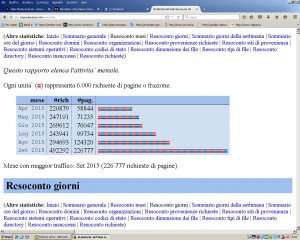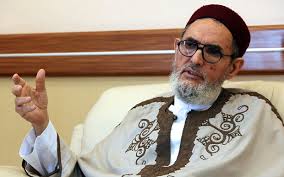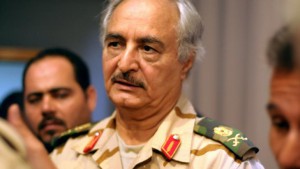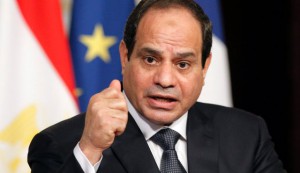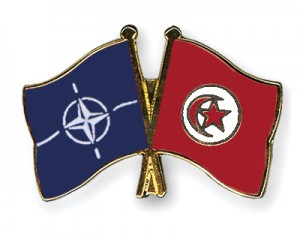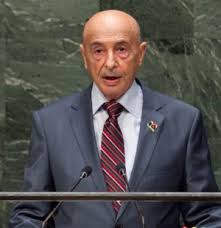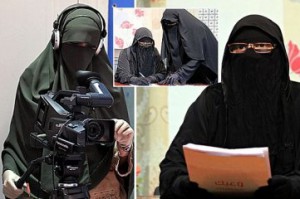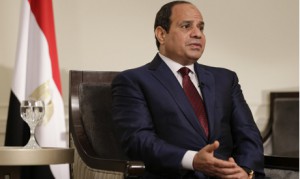Libya’s grand mufti in Tripoli: Dialogue draft invalid if Sharia law not accepted
Sheikh Sadek Al-Ghariani, still accepted by the regime in Tripoli as Libya’s grand mufti, has said that unless the Libya Dialogue agreement accepts Sharia law and has it at the top of the text then it is invalid.
He was speaking to gread applause at a workshop on the UN-brokered Dialogue held today at the General National Congress (GNC). When he arrived to speak, many participants started shouting takbirs (“Allahu Akbar”).
(The Dialogue text in fact says in its preamble that “and that Islamic law (Sharia) is the source of legislation”. However, for Ghariani, who has resolutely opposed the Dialogue until now, nothing less than Sharia being the law, rather than its source, will do.)
The workshop was attended by some 100 key players in the Tripoli regime, including its prime minister, Khalifa Ghwell, members of the GNC, elders and municipal representatives together with other opponents of the House of Representatives (HoR).
None of the GNC’s Dialogue team was in attendance having already left for New York.
Some members of the GNC supported the Dialogue, expressing optimism as to its prospect. Others did not, insisting that the Supreme Court’s ruling last November which they say abolished the HoR and reinstated the GNC had to be accepted.
Abdulraouf Al-Manaie (elected to the HoR for Abu Sleem), when referred to as an HoR boycotter, said he was no not because it no longer existed and therefore he could no longer be a member of it.
In his speech, Ghwell said that the Dialogue was incompatible with the GNC and expressed his absolute opposition to the GNC delegates to the Dialogue continuing to have anything to do with it. He accused them of ignoring what he called “putchists” and “criminal gangs” – a reference to the Libyan National Army and Khalifa Hafter – who had bombed Benghazi, Derna and Kufra “and killed innocent elderly people, women and children”. Claiming to support dialogue, he said it could only be between Libyans who supported the 17 February Revolution.
Libya: Army makes first advance in two months
The army appears to have made progress today in Benghazi’s Leithi district for the first time in two months.
The air assault, which in recent days has focused on IS and Ansar Al-Sharia fighters in Sabri, shifted last night to Leithi and continued for much of today. Both helicopters and jets were used in the airstrikes. The advance by army units was led by at least one tank.
There are, as yet, no details of casualties in Leithi though a soldier was killed this morning by a single shell that landed in Buatni.
Tunisia joins international coalition to defeat Islamic State militant group (Daesh)
Tunisia announced, Tuesday evening, its membership in the international coalition to defeat Islamic State militant group (Daesh).
The announcement was given, Tuesday in New York in remarks of President Beji Caid Essebsi delivered on his behalf by Prime Minister Habib Essid.
“Presently Tunisia examines the fields of contribution to the international coalition. We will see to it to participate actively, wherever resources were available, in some fields,” writes the President of the Republic in his remarks.
The international coalition constitutes “the appropriate framework for joint action and collective commitment against violent extremism”, he said.
“Tunisia accepts to be a leader country in the initiative providing for the international mechanism of edification of potentialities in the fight against terrorism and violent extremism,” Caid Essebsi underlined. The President of the Republic reiterated Tunisia’s commitment to provide an efficient contribution for the achievement of the objectives of this initiative as part of implementing recommendations of the Group of Seven.
He voiced wish to see this initiative provide support to the national efforts and energise Tunisia’s potentialities on the security and military levels in the fight against terrorism. The fight against terrorism is a shared responsibility and a collective effort of all the countries.
It needs a real international political will and rapid action as part of an inclusive and participatory approach, he said. A call was sent to the international community to bolster the security and military services of the countries in war against terrorism and to intensify co-ordination and exchange of intelligence expertise and experiences between all the countries. The call also includes boosting co-operation in the field of border security, justice and fight against money laundering and different other fields related to the activities of searching terrorists. Tunisia endeavours presently, in co-ordination with the committee of fight against terrorism stemming from the Security Council, for the finalisation of a comprehensive national strategy against terrorism based on prevention, protection, observation and response. This strategy includes security, social, economic, intellectual, cultural, media, educational and religious dimensions to prevent and fight against terrorism.
A particular interest will be granted to the issue of foreign terrorist fighters through banning travel for some doubtful categories towards the conflict zones and keeping an eye on fighters returning to Tunisia, further indicated Caid Essebsi.
He reminded, in this respect, Tunisia’s membership in the international mechanism against terrorism as well as the mobilisation of means and potentialities for the fight against this phenomenon. He cites the adoption of a new law against terrorism and money laundering, the establishment of a judiciary pole and another for security as well as the creation of a security and military intelligence agency.
tap.info.tn
Sisi, Al-Azhar participate in Summit on countering Islamic State, extremism
President Abdel Fatah al-Sisi is to participate in a summit on countering the Islamic State (IS) group and violent extremism Tuesday, on the sidelines of the 70th UN General Assembly meetings in New York, Youm7 reported.
Additionally, a delegation from Al-Azhar assigned by Grand Imam Ahmed al-Tayeb is also to participate in the summit.
The delegation will present Al-Azhar’s efforts to counter extremist ideology inside Egypt through targeted outreach, and outside Egypt through peace missions, according to Youm7.
The delegation plans to present to the summit how Al-Azhar is spreading the culture of moderate Islam of tolerance and peace, and supporting the dialogue between different cultures and civilizations to promote peace.
On Dec. 3, more than 700 Islamic and Christian scholars from 120 states participated in Al-Azhar’s Cairo International Conference on Countering Extremism. During his speech Tayeb said that extremists’ “twisted understanding” of the religion is complex, because they also give themselves the right to declare other Muslims apostates and kill them.
President Sisi called in January for a “religious revolution,” in order to “correct misconceptions” of Islam and to fight extremism.
NATO is ready to provide assistance to Tunisia
Prime Minister Habib Essid met with Jens Stoltenberg, Secretary-General of the North Atlantic Treaty Organisation (NATO), on the sidelines of the UN Sustainable Development Summit and the high-level debate of the 70th session of the UN General Assembly.
The NATO Secretary-General welcomed the progress made by Tunisia in the establishment of democracy and stability, saying Tunisia is now a successful model of democratic transition in the region, in view of the situation in countries of the region (conflicts and proliferation of weapons and foreign fighters).
Jens Stoltenberg expressed “satisfaction” at the level of co-operation between Tunisia and NATO through the exchange of expertise and information.
“NATO is ready to provide assistance to Tunisia and continue supporting its skills in the security field to meet the challenges,” he affirmed.
The Prime Minister spoke of the security challenged faced by Tunisia such as the terrorist threat and the proliferation of weapons, noting that the situation in Libya is of “concern to the whole region.”
He, in this context, stated that the perpetrators of Bardo and Sousse attacks were trained in Libya, stressing the need for the international community to further support the Libyan political dialogue to bring together all Libyan stakeholders around a national unity government and a political consensus.
Libya: no “blind eye” for terrorism, Saleh warns UN
It was unacceptable for the international community to turn a blind eye to terrorism in Libya, the president of the House of Representatives (HoR) Ageela Saleh told the United Nations General Assembly today.
Speaking in New York, Saleh said that either sanctions were imposed on those who were obstructing the country’s political progress and security, or the international community should make it clear that Libya was on its own in the fight against terrorism. He called for “genuine and active cooperation” from the outside world against terrorists.
Saleh said the world needed to be supporting the elected and legitimate government and enforcing the UN Security Councils Resolution 2174. This calls for the accountability of all those who use violence against civilians and civil institutions.
He went on to warn that the international arms embargo on Libya was depriving the Libyan armed forces of the weapons and training that they needed to combat terrorism. The terrorist destabilisation of Libya threatened regional relations and global peace.
Saleh also appealed for the international community to help regain control of Tripoli and bring about the withdrawal of militias and armed groups from state institutions. He went on to urge the isolation and sanctioning of institutions that were not subject to the control of parliament and the government
Libyan army kills 7 Islamic State militants in Benghazi
Libyan army forces, backed by air force and artillery, on Sunday killed seven Islamic State (IS) affiliated militants and captured nine others in the eastern city of Benghazi, according to a military source.
“Major General Khalifa Haftar, general commander of the Libyan army, issued direct orders on Saturday to launch a full military operation in Benghazi, involving heavy artillery, air force, and infantry. The army forces managed to progress towards Al-Sabri area,” Khalifa Al-Obaidi, head of information office of the Libyan Army, told Xinhua.
“Infantry broke into Al-Noran hotel in Al-Sabri area, killed seven IS affiliated militants and captured nine others, including three foreigners,” Al-Obaidi said.
Major General Khalifa Haftar announced last week the launch of military operation “Doom.” Haftar said it is the final stage of operation “Dignity,” launched in May 2014 against extremist groups in the country.
The Libyan army, led by retired Major General Khalifa Haftar, has been engaged in a war against extremist groups for over a year in the city of Benghazi, the birthplace of the 2011 turmoil in which former leader Muammar Gaddafi was toppled.
Libya has slipped into a state of anarchy and insecurity since Gaddaif’s fall in 2011. The North African country is plagued with continuous clashes and escalating violence.
English-speaking female jihadis in Libya issue Islamic State call to arms
English-speaking female jihadis have been using social media to try to lure western Muslims to join them with Islamic State in Libya, a new front in the war on terror just 400 miles from Europe’s shores.
Three native English-speaking women have been monitored for months by the Institute for Strategic Dialogue, a UK-based thinktank, and are believed to be British. They say they have been living in the wartorn north African country since at least the start of the summer.
Using a variety of social media platforms, including Twitter and encrypted messaging apps such as Surespot and Telegram, the three have reached out to their hundreds of followers, and as routes into Syria via its 500-mile border with Turkey have become further restricted they have advertised the journey to Libya as the easiest way of joining Isis’s so-called caliphate.
Isis has been in Libya for just over a year and the country is home to its largest forces outside of the Middle East. The group has its headquarters in the northern coastal town of Sirte, birthplace of Libya’s late dictator Muammar Gaddafi, but also has a training base to the west of the capital, Tripoli.
Melanie Smith, ISD researcher and an expert in western female jihadis, said evidence of women travelling to Libya to start a new life under Isis represented a dangerous tipping point.
“Where we see movements of women migrating, that represents the organisation [Isis] trying to consolidate their territory and state-build rather than just fight and conquer territory. [And] the more that you consolidate that territory, the more you populate that territory, the more difficult it is for that to change,” she said.
In late June one woman calling herself Umm [sister] Unknown wrote: “Come to Libya. Hijra [religious migration] is not only to Shaam [Syria] now. Libya needs you too.”
The same day, she added: “5 brothers made hijra about a month ago and they are all shaheed [martyred] … the mujahideen in Libya need you!!!!”
Umm Unknown’s Twitter account was operational for nearly two years before being suspended. She stated she arrived in Libya on 19 June 2015, posted links to various events in Libya, and had connections with one verified English-speaking fighter in Libya and the two other native English-speaking women also understood to be in the country.
A second extremist going under the name Umm Asiyah, questioned via Ask.fm, an online question forum, why she had gone to Libya, replied: “To live under the Shariah [law] of Allah.” She also tweeted about the pain of leaving her family. On 2 July she wrote: “Every time I hear my mom’s voice I die a little may Allah get her out of Darul Kufr [land of unbelief].”
A week earlier she tweeted that getting to Libya was “not as hard” as travelling in Turkey.
The third radical, Umm Mus’ab, said she had arrived in Libya as early as May 2015, telling her followers to “Come to the land where no man will ever see your face.” Commenting on life in Libya she replied: “It’s mind bogglingly great.”
While none of the now-suspended accounts made any explicit mention of a previous existence in the UK, Smith said other pieces of evidence pointed towards British associations.
“The type of colloquialisms they use are quite common among the other British women we follow who are in Syria and Iraq; very similar language, very similar slang, and references.”
Smith added that their social media networks were “very British-heavy” and they associated with known UK jihadis fighting abroad and domestic UK extremists.
This week a jihadi from east London who is living in Isis’s self-proclaimed capital of Raqqa, Syria, encouraged her followers to go to Libya. The woman, who is in her early 20s and of Pakistani heritage, is understood to have become a widow after her husband was killed in mid-July.
“How many brothers & sisters rn in Turkey, cannot go back home and cannot enter in … Make your Visa and go to #IS in #Libya,” she wrote on Twitter adding, “we need to raise more awareness”.
Smith said the trend of looking to Libya as a new area for extremists was growing. “They [jihadis] speak about Libya as the new frontier and as an extension of the caliphate. And it appears that the game plan [for a terrorist attack] would be to go through Libya and up into Europe. So the proximity of Libya being on the tip of north Africa is geographically quite worrying.”
From its stronghold in Sirte, Isis has pushed along the coast east and west, and south into the Sirte basin, the largest concentration of Libyan oil fields. More than a dozen fields have been overrun with engineers killed and at least nine kidnapped.
Its second base is on the outskirts of Sabratha, west of Tripoli. That area belonged to Islamist militia Ansar al-Sharia, the group blamed by Washington for the killing of US ambassador Chris Stevens in Benghazi in 2012, until it declared its loyalty to Isis.
At the Sabratha base, a former military depot outside the town, volunteers receive training, many then leaving for Iraq, Syria and Tunisia. Tunisia’s government said the homegrown attackers who struck at tourists in the capital’s Bardo museum and Sousse beach resort earlier this year were trained at this base.
Isis has grown because Libya’s elected government is battling an Islamist-led force, Libya Dawn, which last year captured Tripoli, plunging the country into civil war. Sirte lies along the faultline between the recognised government’s forces in the east and Libya Dawn units in the west, both of which have fought sporadic clashes with Isis.
Reports from Libya indicate that foreign volunteers are flocking to Isis from Tunisia and sub-Saharan Africa. There is also evidence that many British volunteers for Isis move to Syria via Tunisia and Libya where they receive training before going on to Turkey to transit to Syria. The route makes them harder to detect among the hundreds of thousands of British tourists who flock to Tunisia. However, this is the first evidence that Brits are choosing to settle in Libya itself.
A UK government spokesman said: “The UK advises against all travel to Libya. Anyone who does travel, for whatever reason, is putting themselves in considerable danger. People seeking to travel to engage in terrorist activity overseas should be in no doubt we will take the strongest possible action to protect our national security.”
Egypt’s Sisi to AP: Country in ‘ferocious war’ with terrorism
Egypt’s President Abdel-Fattah El-Sisi said in an interview that the Mideast region needs to cooperate to defeat a worsening terrorist threat that has led to a “ferocious war” in Egypt and created the danger of some countries “sliding into failure.”
In a wide-ranging interview with The Associated Press Saturday night, El-Sisi also said that Syria should not be divided after its civil war, that the Egyptian military needs to be “augmented” to defeat terrorists fighting in the Sinai and Western Desert, and that efforts should be renewed to solve the Palestinian issue and expand Egypt’s nearly 40-year-peace with Israel to include more Arab countries.
Resolving the Palestinian question, he said, could “change the face of the region and … bring about enormous improvement to the situation. … I’m optimistic by nature and I say that there is a great opportunity.”
The 60-year-old former military chief, who ran for president and assumed office in 2014 after his predecessor Mohamed Morsi was ousted in 2013, spoke with AP at a New York hotel on Saturday night after he addressed a U.N. summit that adopted new development goals for the next 15 years. He will also attend the annual ministerial meeting of the General Assembly at U.N. headquarters that begins Monday.
Speaking just days after pardoning and releasing two jailed Al-Jazeera English journalists in Cairo, El-Sisi said he is open to clemency to other journalists who have been tried and convicted in absentia. But he said he would only act within his powers as president and would also respect the prerogatives of Egypt’s judiciary.
“Rest assured that we are always keen on sorting out issues and problems, especially those that relate to journalists and to the media personnel,” he added.
El-Sisi, speaking through a translator, said that regional security is in “its most vulnerable state.”
“Let it suffice to look at the map and find countries that are suffering from failure. There is an increase in the extremist groups. There is the problem of the refugees that are flowing into Europe. With all that in mind, we can sense how difficult and how complicated” the challenge is, he said.
“I don’t want to say we are late in doing what we should have done, but (defeating the threat will require) a lot of effort, and not only a lot of effort but as a matter of fact it entails a good amount of understanding and cooperation from every country … to restore the countries that are now sliding into this vicious cycle of failure.”
In that vein, the Egyptian leader cited what he called an “improving” relationship with the United States. Ties are “strategic and stable,” he said.
It has been a tumultuous period in Egypt. Longtime leader Hosni Mubarak was ousted in 2011 in the Arab Spring revolt that eventually led to the installation of the Muslim Brotherhood’s Morsi as Egypt’s first popularly elected president; he then was ousted amid another popular uprising.
“The last two years were a real test of the endurance and strength” of the ties with the U.S., El-Sisi said.
Since then, Egypt has been fighting an insurgency by ISlamist militants based in the Sinai who have pledged allegiance to the Islamic State group, and militants have carried out bombings and shootings against policemen and troops in Cairo and other cities.
Security forces have cracked down hard on Egypt’s Muslim Brotherhood and other Islamists.
Hundreds of Islamists have been killed and thousands arrested, and Morsi and other Brotherhood leaders have had death sentences issued against them in multiple trials.
The trials and the crackdown have brought heavy criticism from human rights groups. El-Sisi’s government contends the Brotherhood is complicit in violence, a claim the group denies, saying authorities want to crush them as a political opposition.
Asserted El-Sisi: “The problem with the Muslim Brotherhood is not a problem between the government of Egypt and these people. The real problem is between the Egyptian people and the Muslim Brotherhood.” He said the Brotherhood has given “a very bad impression” and Egyptians “are not able to forgive and forget.”
The Egyptian military, he said, “has always been a factor for stability” and should be strengthened because it faces “a ferocious war against terrorism and extremism … Increasing the military capability of the Egyptian military means that it can strike a strategic balance” for the region.
Referring to the civil war that has shattered Syria, the president said “we are very keen that Syria remains as a nation and as a state and does not divide into smaller states.”
He warned that the collapse of Syria would mean that all its weapons and equipment would fall into the hands “of the terrorists.” If that happens, he said, the danger will not only hurt Syria but spill over to its neighbors and “will pose a serious threat to the rest of the region, and this is what we fear.”
Asked how extremists could be neutralized, he offered no immediate solution: “This is exactly the dilemma we are talking about.”
ahram.org.eg
- « Previous Page
- 1
- …
- 190
- 191
- 192
- 193
- 194
- …
- 248
- Next Page »
